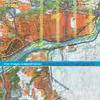 For this album the Magic Carpathians have played many roles: field guides, sonic scouts, and acoustic archaeologists investigating the musical heritage of the land they call their home. They have been applying the varnish to some improvised sessions recorded over a nearly sleepless two day period high up in a mountain lodge back in 2008. The results are like the whorls in a piece of wood picked up off the forest floor: fractal like, mesmerizing and endlessly intricate.
For this album the Magic Carpathians have played many roles: field guides, sonic scouts, and acoustic archaeologists investigating the musical heritage of the land they call their home. They have been applying the varnish to some improvised sessions recorded over a nearly sleepless two day period high up in a mountain lodge back in 2008. The results are like the whorls in a piece of wood picked up off the forest floor: fractal like, mesmerizing and endlessly intricate.
Besides being fine musicians the Magic Carpathians are also adept ethnomusicologists. Marek Styczynski has had a long standing interest in preserving musical instruments from the Carpathian Mountain region, which forms a long arc stretching across Central and Eastern Europe. Some of these, like the gajdica–a unique clarinet from Slovakia–can be heard on Acousmatic Psychogeography. Marek is interested in preserving these instruments not only as artifacts, but by bringing them into modern and electronic musical scenarios he extends their cultural reach, sustaining them longer in time; in doing this important work he finds a new audience for their sounds.
The album opens with long player "Detournament." Marek sings "faces of passing people," which forms a kind of refrain, evoking images of the flaneur. Anna Nacher further elaborates the theme, singing of "wasting time endlessly, roaming the streets, circling around, looking down." The music is perfect for the idle lounging and rambling she describes. Lazy guitar lines, fed with a bit of drive from the tube amps, meander over a thin sheet of watery loops, gradually building in distortion. The hallucinatory improv set climaxes with sounds of frayed analog fire.
"Derive" is a psychedelic sand box of open source synthesis. Slide guitars start the affair, before graduating onwards with heavy strains on the wah-wah pedal. The flubbering bass line gels together the other musical elements, which form a kind of ad hoc bricolage. This song along with "Drifting," faithfully evince the Situationist concept of the drift. Sputtering like a late night basement session, the songs create new maps out of old territory, psychically manipulating familiar psych-rock terrains, molding and shaping it into new contours. This is accomplished not only by the inclusion of instruments like the gajdica, mentioned earlier, but also the uchiwa-daiko, a type of Japanese fan drum, dulcimer, pistiala and other unusual sound devices.
The final song, "Ley Lines," picks up where "Drifting" left off, using vocal loops and ethnic wind instruments. The trajectory moves sideways from what is typically expected of a song, just as the old straight tracks, affectionately known as leylines among various seekers investigating Earth mysteries, allegedly connect sacred geographical sites, without recourse to modern notions of urban planning. The energy of the album is concentrated in the middle, making this closer a pleasant departure, as the last swirls of a dream moving from the unknown back into the known.
samples:
 
Read More


